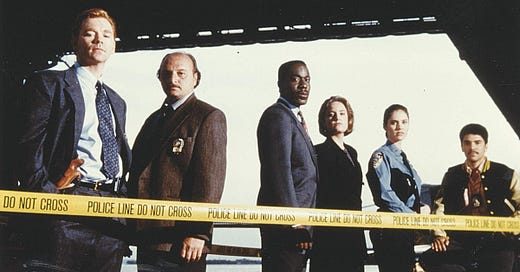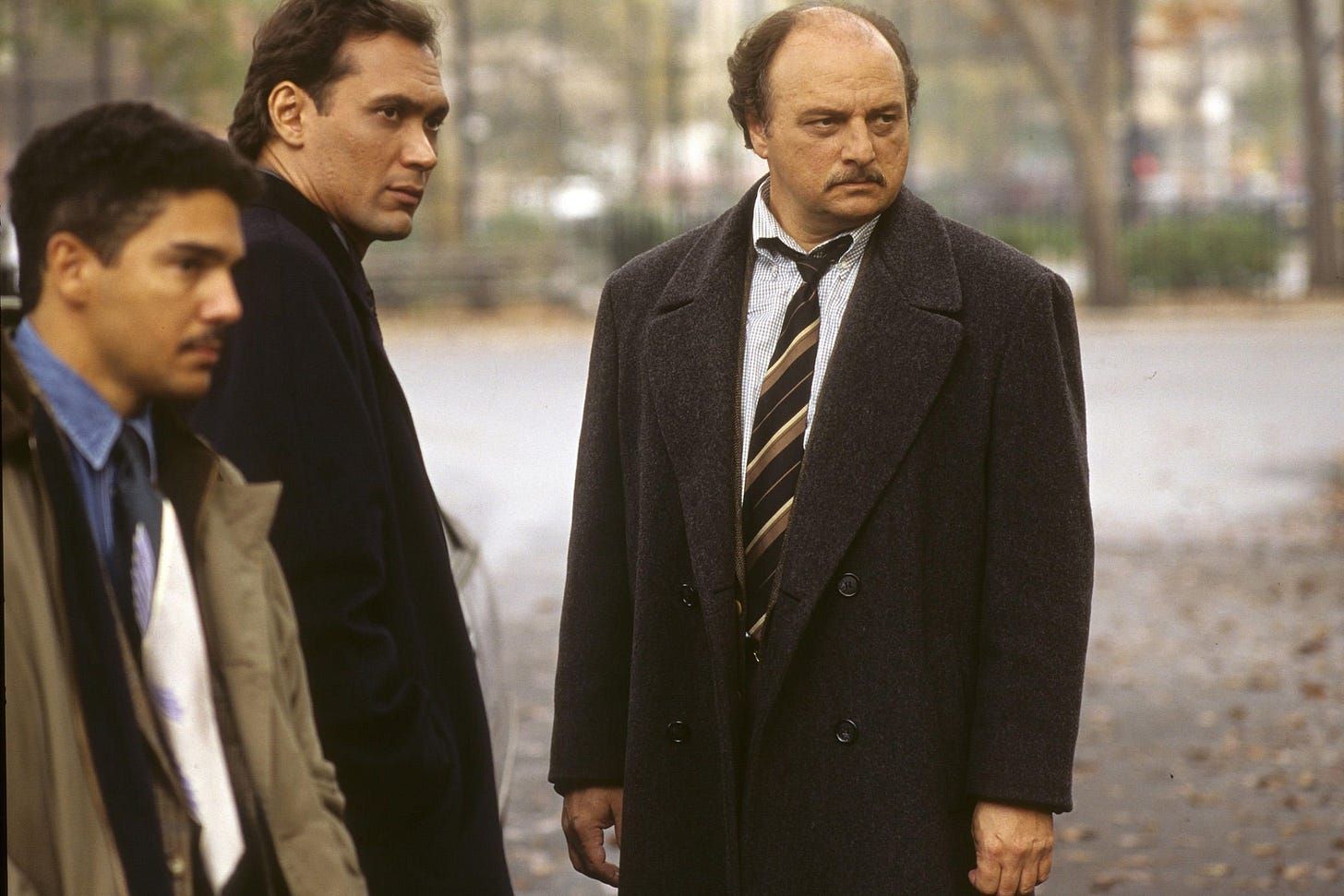Ipsa this: 'NYPD Blue' at 30
Plus, 'Sex Education,' 'Winning Time,' 'The Continental,' and more
This week’s What’s Alan Watching? newsletter coming up just as soon as I compare you to a pancake…
What’s Alan writing?
As promised, this week’s Rolling Stone output was substantially higher than last week’s. I’ll have separate items for some of those stories, but here are links to three of them:
I’ve been hearing about Dan Harmon’s animated Fox comedy Krapopolis — and about how important it reportedly is to the now studio-less Fox network — for years, including announcements that Fox ordered a second, and then a third, season before the first episode had even aired. With the obvious caveat that most comedies, both live-action and animated, can take a while to find themselves, the three Krapopolis episodes I was given did not suggest that Fox has picked an obvious winner.
Peacock’s The Continental: From the World of John Wick assumes that the reason people love the films is the mythology and generally weird atmosphere of assassin world, and not because Keanu Reeves is one of our greatest and most beloved action stars. The three-part miniseries has some cleverly staged fight sequences, especially in its finale, but all involve characters you’ll struggle to care about, and they will be flanked by way too much talk about the origin of the gold coins, the High Table, and all the other John Wick lore that was a lot more fun when we were only given broad hints. Oh, and the villain is played by Mel Gibson, which is… what’s the exact opposite of “fun”?
I’m practically running out of things to say about this all-timer final season of Reservation Dogs. This week’s penultimate episode at least gave me something to new to write about by bringing in the great Ethan Hawke to add to his list of bad fathers who desperately want to be good fathers. Just an amazing duet between him and Devery Jacobs.
Sex Education and the case of the terrible protagonist
In the past, I’ve used the term “donut show” to describe a series filled with lots of great supporting characters, writing, direction, etc, but all of that circling a forgettable main character. (Andor is a recent example, and one which was able to ultimately overcome Cassian’s blandness.) Sex Education, whose fourth and final season debuted yesterday on Netflix, is an example of a more serious variant of this idea, where the main character isn’t just less interesting than everyone else, but is aggressively annoying, in a way the show only partially seems aware of. I’m still workshopping a name for this phenomenon, but some BlueSky followers have suggested both “peach show” (because “you must remove the hard stone in the middle to enjoy everything else around it”) and “Thanksgiving sides show” (if you grew up in a family where the turkey was always way too dry).
The thing is, this type of show doesn’t usually start out this way. People loved Rory Gilmore in those early Gilmore Girls seasons, and with good reason. (Amy Sherman-Palladino shows often have blind spots regarding annoying characters, even if they aren’t always the lead.) And when Sex Education debuted back in 2019, Otis was crucial to what made it work. Over time, though, he’s curdled into the person I least want to see when I put a new episode on.
Now, I haven’t finished the season as of this writing, which is why I haven’t done a proper review. And perhaps the concluding arc will be all about redeeming him from a multi-season slide into insufferable narcissism. But while Eric, Maeve, Ruby, Jackson, and so many other characters (including all the newbies at the more progressive school everyone attends this year) remain complicated and appealing, Otis is still a one-note drag. Eric and others call him out on it, but not nearly enough to compensate for having to sit through him acting like an idiot.
In this case, the problem seems to be the result of another annoying TV creative trend: The Moonlighting Fallacy (my pal Linda Holmes explains its origins here), where writers become so terrified of what might happen if they resolve the will-they-or-won’t-they tension between two main characters that they keep contriving dumb reasons to keep them apart. More often than not, the damage caused by dragging this stuff out is far worse than any hypothetical loss of spark would be if a couple got together sooner. Sex Education is an unfortunate case study in this, as it has contorted itself so much over the years to prevent Otis and Maeve from becoming a proper couple that Otis has become an insufferable ass in the process.
I’m still looking forward to watching the remainder of the final season. But the temptation to skip past certain scenes is very high.
Winning Time ends on a losing note
Back in July, I binged screeners of the entire second season of HBO’s Winning Time, which ended with the Lakers losing to the Boston Celtics in the 1984 NBA Finals, and closed on a shot of Quincy Isaiah as a devastated Magic Johnson, sitting on the floor of a Boston Garden locker room shower, letting his uniform get soaked. After all the hype and expense, Season One got a single Emmy nomination, HBO reduced the Season Two order from 10 episodes to 7, and nobody seemed to be talking about it at all, other than complaints from the real Jerry West and Kareem Abdul-Jabar. So I had a feeling the show’s future was precarious and thought, If this winds up being the series finale, that is a terrible concluding image.
The seventh episode did, in fact, turn out to be the series finale, but Magic in the shower was not the concluding image. In a strange turn of events, HBO wound up airing a slightly altered version of what I saw in the summer, adding a new scene with Jerry and Jeanie Buss, followed by a photo montage explaining what happened to everyone in the years following that loss to Boston.
As I wrote on Monday, the tacked-on ending didn’t really assuage the problem that a show called Winning Time climaxed by dramatizing one of the worst losses in Lakers history. The series was messy, and Season Two struggled a lot with trying to squeeze four seasons of basketball into seven hours of television. But that’s such a bad note to have to go out on. Man.
Still feeling Blue, three decades later
Finally, we have our second big 30th anniversary of a TV show in as many weeks, as yesterday marked 30 years since NYPD Blue debuted on ABC, which inspired an essay on the show’s important but complicated legacy.
As many of you probably already know, NYPD Blue is basically responsible for my career as a television critic. I began recapping episodes early in the first season, and eventually built a whole website around the show. (The server it lives on is down, possibly never to return, but you can admire my 1995 web design skillz over at the Wayback Machine.) Between its pushing the outer envelope of broadcast network content standards and the audience’s embrace of Dennis Franz’s racist, alcoholic, anti-hero cop Andy Sipowicz, the series holds a crucial place in the history of TV drama. (It’s hard to imagine Tony Soprano, Vic Mackey, Walter White, et al if Sipowicz hadn’t paved a way for them.) And it’s a foundational text for my own history, and one for which I will always hold deep affection.
Here, for instance, is a photo one of the show’s directors took of me while I was visiting the set, wearing a leather jacket I was way too proud of at the time. Note the familiar profile of a certain four-time Emmy winner in the background.
But as I talk about in the essay, there are parts of the show that have not aged well at all — many of which probably shouldn’t have been so beloved even at the time. (In my review of the first episode where we saw Sipowicz beat a confession out of a suspect, while pretending to be a human lie detector, I wrote “While there's a part of me that cheered when Andy started saying ‘Beep Beep,’ there was a part of me that was disturbed — both by the fact that Andy was doing it, and by the fact that I approved.”) And even beyond its frequent use of police brutality, the show in hindsight is a lot more formulaic than the cable and streaming series it would help inspire. As I cherry-picked scenes from episodes on Hulu to research the essay, I was startled to be reminded of certain tedious subplots and even characters I had long since pushed out of my head.
But part of revisiting older art is factoring in the context of the time in which it was made. No, the beatings and the more shameless copaganda shouldn’t have been acceptable in any era. But the Case of the Week structure was simply how television functioned at the time(*), and David Milch and company were able to work miracles, both large and small, within that structure for many years. (The post-Milch seasons, not so much, even if those episodes were more consistent and less inscrutable than what Milch was writing towards the end of his tenure.) The parts that were great then are still great now, and some of them did even more of a number on me as a middle-aged family man than they did when I was a single guy in his late teens and early 20s.
(*) And, as we’ve talked about, TV should try to function that way more today, rather than always doing serialization for the sake of serialization.
When NYPD Blue ended in the spring of 2005, I wrote a bunch of stories for The Star-Ledger as a proper send-off for a landmark show. One of those was a list of the 10 best episodes, which offers up a representative sampler of the series at its strongest in each era. If you’re not interested in the Schroder or Gosselaar years, swap those episodes out for the Season Five two-parter “Lost Israel.” But really, almost anything from the first three seasons is outstanding. And while I use this gif of an angry Sipowicz as a social media meme, its actual use in Season One’s “NYPD Lou” — where Andy is venting his fury after acting calm and even empathetic while getting a pedophile to confess to a child murder — is devastating.
What a show this was at its best. What an incredible, incredible show.
When Ryan Atwood met Sipowicz
Actually, no, I can’t end the newsletter quite yet, because I still haven’t shamelessly promoted Welcome to The O.C. (In case you didn’t know, the oral history book is still available to pre-order, and you can still get a bonus chapter from by pre-ordering.) In this case, I have a natural segue for the plug, courtesy of this scene from the deservedly-maligned third season, where Ryan winds up at a strip club with one of Sandy Cohen’s business partners.
The context for exactly why this scene exists, and how it’s an inside joke at the expense of Ben McKenzie, is something you’ll have to read the book to find out. But the backstory amused me very much when I learned it. And it felt weirdly reassuring to have an excuse to discuss Dennis Franz for a minute in the middle of a book about people who do not particularly resemble Dennis Franz.
That’s it for this week! What did everybody else think?












That Reservation Dogs episode isn't just an all-timer, it would make a good proselytizing episode, which is the one you tell your skeptical friend/relative to watch when you're really trying to get them to watch the whole series. The proselytizing episode is rarely the pilot (which can be awkward or dissimilar to the later vibe of the series); you choose one that's largely self-contained, doesn't require knowledge of a long backstory, may involve a guest star your skeptic really likes, may involve a story that you think will resonate with them. Elora's Dad meets those criteria AND you get to tell your skeptic that the woman playing Elora wrote the script.
I completely agree about Otis and Sex Education; I've set aside this weekend to watch Season 4 but I'll definitely be focusing more on my knitting during Otis's scenes -- unless they have him become noticeably less of a self-centered jackass very quickly. But that supporting cast is so good! I'm not surprised that many of them are successful in a wide variety of projects, and I can't wait to see Ncuti Gatwa as The Doctor.
On your point about NYPD Blue glorifying police brutality at times it reminds me of a point I truly believe and said alot in the wake of George Floyd, if the liberals in Hollywood truly want to make a difference, rather than marching for BLM or donating money or tweeting, the biggest thing they could do to bring real change would be to make Internal Affairs Depts the hero’s of every cop show
Use the cultural and soft power of mass entertainment to make its clear the cop who reports his partner for misconduct is the hero not a rat, a few years of that across the board in movies and TV will make a real difference in how Americans view such things